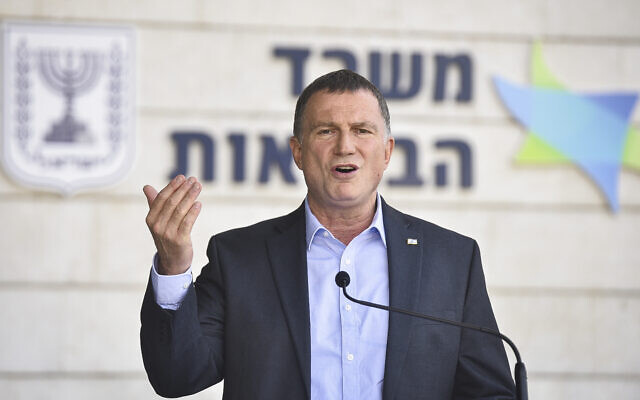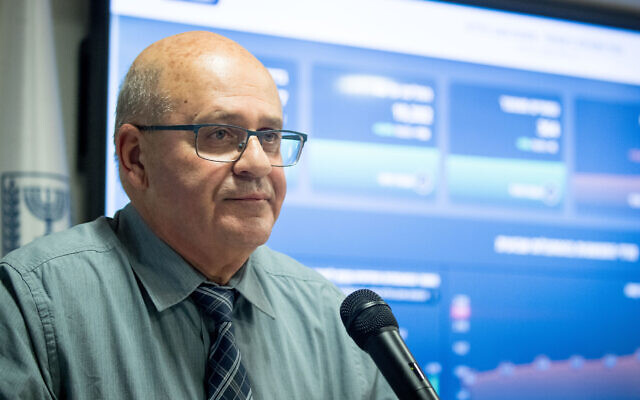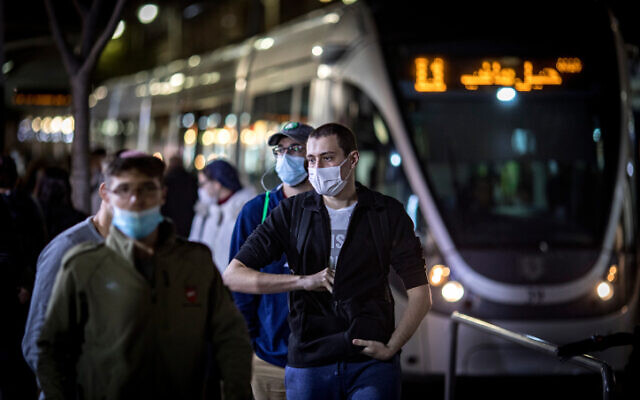Infections continue to trend upwards while Israel prepares for major inoculation project later this month

Health Minister Yuli Edelstein on Friday hailed a US government advisory panel’s decision to endorse Pfizer’s coronavirus vaccine as “huge news for Israelis,” and said he’d instructed ministry officials “to review the approval and present their recommendations in the coming days.”
Israel has agreed to purchase millions of vaccines from Pfizer, and according to some reports, could receive up to four million doses by the end of the month. First deliveries of hundreds of thousands of vials arrived on Wednesday and Thursday.
The Food and Drug Administration must still sign off on the panel’s recommendations, but is widely expected to do so. Israel is expected to follow suit.
Pfizer expects to produce up to 50 million vaccine doses by year’s end, and up to 1.3 billion in 2021. Moderna’s vaccine candidate is also expected to be reviewed in the coming days. That company, too, has agreed to supply Israel with millions of doses.
Edelstein said the Health Ministry was continuing extensive preparations for the massive vaccination operation that is scheduled to begin on December 27, with some 60,000 vaccinated every day.
Meanwhile, Israel’s infection rate continued to trend higher, with the Health Ministry saying 1,865 new cases were diagnosed Thursday. Some 70,000 tests were conducted, with 2.7 percent coming back positive.

The death toll since the start of the pandemic stood at 2,962.
The government on Thursday dropped plans to tighten restrictions over the Hanukkah holiday, its second apparent policy reversal in under a week. But ministers instead agreed to tighten health rules when the number of daily cases hits 2,500, Hebrew media repots said.
Prime Minister Benjamin Netanyahu agreed to scrap the Hanukkah rules following consultations with Edelstein and Defense Minister Benny Gantz, according to Channel 12. Another proposal to impose a nightly nationwide curfew was similarly abandoned earlier this week after facing legal obstacles.
Channel 12 reported Thursday that the Health Ministry is weighing restricting travel and access to certain public venues for Israelis who refuse to be vaccinated against COVID-19.
Under the proposal being considered, those who refuse to be inoculated will only be allowed to fly, attend certain events, dine at restaurants or frequent cultural venues by providing a recent negative result from a coronavirus test, according to Channel 12 news, which quoted unnamed senior officials.
Health officials were also reportedly considering barring medical personnel who refuse vaccination from working in coronavirus wards or intensive care units.
The proposal, which could encourage Israelis reluctant to be vaccinated to do so, is expected to encounter legal challenges if adopted.
Channel 12 also said Health Ministry Director-General Chezy Levy was looking at the possibility of not policing the order of vaccination, as the public may at first be hesitant to get inoculated.

If the ministry has enough doses and there is not enough public interest, officials may simply allow anyone who wishes to be vaccinated, the report said.
Emergency approval could come from the FDA in the coming days, after a panel of experts on Thursday endorsed the widespread use of the vaccine, saying it was safe and appeared to be effective for those 16 and older.
Levy, speaking at a Hanukkah event, also warned that infection numbers are mounting across all strata of society.
“We see a rise in the number of sick daily and also in the weekly average. It’s not just because there’s more tests,” he said.
He warned that Israel’s viral reproduction rate, which represents the average number of people a COVID-19 carrier infects, was at 1.24. “This is a high [rate],” he said, noting that it had been at 0.8 when Israel emerged from lockdown.

Any rate above 1.0 indicates the spread of the pandemic is accelerating.
Thursday is the first night of the eight-day holiday of Hanukkah, which is often marked by extended family get-togethers in the evening for traditional candle-lighting events. The government has consistently attempted to impose restrictions over holidays throughout the pandemic, fearing that gatherings will bolster the spread of the virus.
Health officials have warned that another nationwide lockdown — the third since the start of the pandemic — could be unavoidable as the number of cases continues to rise. Israel imposed its second nationwide lockdown in mid-September over the High Holidays, and it remained fully in place until mid-October, when the government began to gradually lift the rules. It has yet to lift all the restrictions imposed at that time.
As reported by The Times of Israel
